
Volunteering can be a rewarding way to give back to your community or help those in need, but did you know that it can also benefit you professionally and be a great way to gain a competitive edge in a job search?
Are you a young professional or recent graduate with little-to-no employment history seeking to get hired for your first professional job?
Or maybe you are an experienced professional who is thinking about changing careers.
In either case, a volunteer position can be a great way to gain experience in your desired field. Adding volunteer work to your resume can also help hiring managers better understand the type of person you are and the value you bring to the workplace.
Keep reading to learn when and why you might want to consider including volunteer work on your resume. Plus, get some pro tips and resume examples showing where and how to list your volunteer work on your resume.
Can Volunteer Work Really Build a Stronger Resume?
Volunteering can be a personally fulfilling way to spend your free time and offers a unique opportunity to develop skills, explore career paths, and build a strong resume. Besides your altruistic reasons for volunteering, here are four primary ways volunteer work can benefit your career.
Gain New Experiences
Volunteering is an excellent way to gain experience in your chosen profession or industry. It can be tough to break into a new industry or profession when you have no experience in the field to add to your resume. Volunteering allows you to overcome this hurdle.
The knowledge and skillset acquired in volunteer roles can be transferred to the workplace. For example, if you volunteer at a soup kitchen, chances are you’ll develop strong customer service and communication skills that employers will appreciate.
Volunteers also often have the opportunity to develop interpersonal, critical-thinking, fundraising, community outreach, teamwork, event planning, and many more transferable skills valued in the workplace. In the ideal situation, you may even gain hands-on experience in the work you hope to do in your career.
Whether volunteering brings you closer to your local community or allows you to travel abroad, all experiences gathered along the way will strengthen your resume.
Ultimately, volunteering is a great way to add depth and breadth of experience to your resume while honing new skills that will benefit you in professional roles down the road.
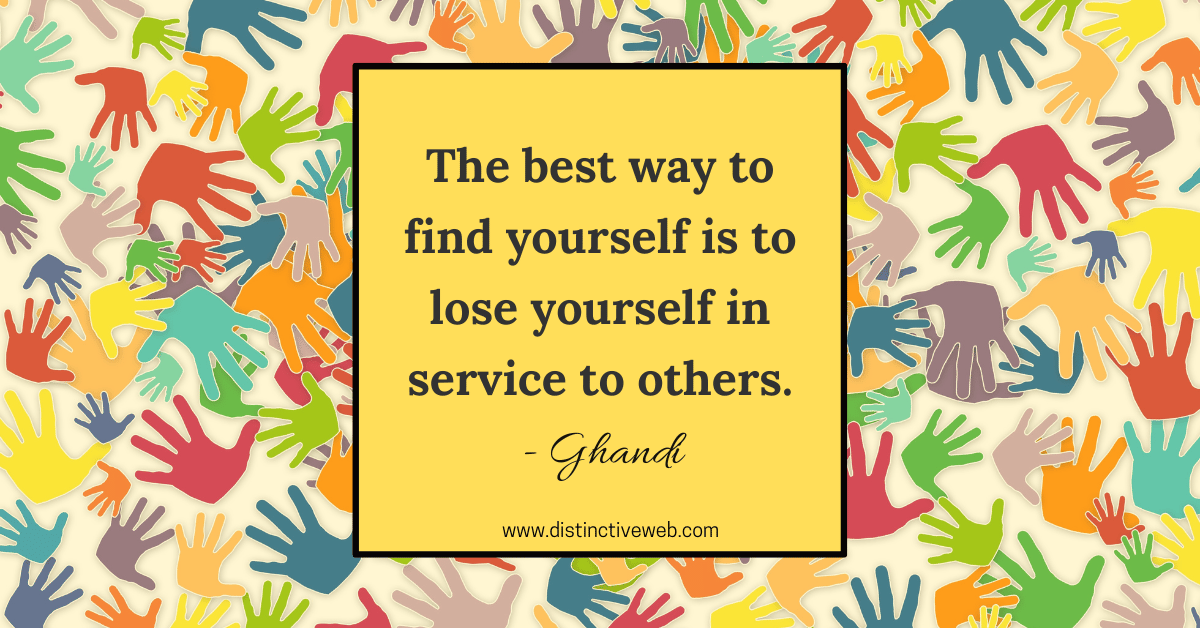
Apply Your Skills in New Ways
Not only does volunteering provide a sense of purpose, but it is also an opportunity to get out of your comfort zone and explore new interests and ideas. In addition, by volunteering, you can use your skills to help make a positive impact on the community while also learning and developing your abilities further.
Participating in volunteer activities demonstrates ambition and tenacity. From working with underprivileged youth to engaging with professionals in a specific field, volunteer activities provide invaluable insight that cannot be found through traditional resume-building activities.
Working with different volunteer teams also gives you a chance to apply the knowledge, skills, and resources you already have in a fresh environment. Volunteering represents a unique opportunity to practice selfless giving while learning lessons and invaluable skills that may not be found elsewhere.
Volunteering could also introduce you to different career paths or broaden your thinking about using the skills you currently possess.
You could even learn new ways of using your skills that you didn’t realize existed outside of your daily job, which can make you more creative and innovative in your paid work.

Meet New People & Build Your Professional Network
With every new experience comes new people.
Meeting new people is a necessary part of volunteering; you will meet people from all walks of life with different experiences, backgrounds, and contacts. Some may become friends, some may know of opportunities for you, and some may have some interesting stories that can help you decide what path you want to take.
Most important: Volunteering may open up doors for networking opportunities with people who work in your field or industry; these contacts may even lead to job offers down the line!
Gain a Competitive Advantage
Incorporating volunteer work into your resume and job application adds a unique dynamic that may be just what employers are looking for.
Employers often look for individuals who demonstrate leadership skills and have a strong sense of social responsibility, qualities that are often developed through volunteering. For the same reason, volunteering is also a great way to enhance your college application, as many universities prefer applicants with volunteer experience.
Working as a volunteer can also improve your mental outlook, making you more attractive to hiring managers. You can feel great knowing that you are helping your local community or others in need or contributing to a personal and worthy cause. These can give you a refreshed outlook on your life, and with that comes more personal satisfaction and confidence. And those feelings will shine through to any interview and make you a memorable and positive candidate for your upcoming career change.
Not only will volunteering show hiring managers that you’re passionate and motivated, but it can also bridge the gap between education and experience. In short, besides giving back to your community, volunteer work helps hone talents, develops character, and resonates in the form of benefits that extend far into the future.
Find New Volunteer Opportunities
If you are eager to volunteer but haven’t found the right opportunity, here are some resources to help you.
VolunteerMatch – This organization states its purpose as: Bringing people and communities together through service. The website is super easy to use. Just insert your zip code and some other basic information to find opportunities for service that match your talents and interests.
AmeriCorps – Search for and be matched with service opportunities throughout the United States.
AmeriCorps for Seniors – If you are 55 or older and looking for opportunities for service, check out this website.

When Should You Include Volunteer Work On Your Resume?
No matter what stage of life you’re in, there is no denying the potential benefits of volunteering—from developing valuable skills to establishing meaningful connections within an industry—all while making a difference in local communities across the globe!
But whether or not you should include that volunteer work on your resume depends on where you are in your career journey and what kind of position you’re applying for.
In general, if you fall into one of the following three categories, including volunteering experience on your resume can often help you gain a competitive advantage over other job searchers.
- 1
If you are starting out in your career and don’t have a lot of paid work experience.
- 2
If you are an experienced professional who wants to make a career change and has gained relevant experience through volunteer experiences.
- 3
If you are an experienced professional who wants to advance your career to the next level and has gained relevant skills through volunteer work.
More specifically, when deciding whether or not to list your volunteer experience on your resume, it is helpful to remember these rules:
If your volunteer experience enhances your qualifications for the job you are targeting, include it on your resume.
If the volunteer experience doesn’t strengthen your qualifications for the job you are targeting, exclude it.
(PRO TIP: This is a good rule of thumb when deciding whether or not to include any particular item on your resume, not just your volunteer work.)

How To Add Volunteer Work to Your Resume
You have many options regarding how and where to list your volunteer work on your resume.
One of the first questions many job seekers ask is, “Do I need to create a separate section on my resume for my volunteer experience?”
The answer to this question is: “It depends.”
Your resume isn’t meant to be an autobiographical listing of everything you have ever done. Instead, your resume should be a marketing document created to show how you are the best candidate to fill a specific position or type of position.
It is helpful to remember that experience and skills are still experience and skills, regardless of whether they were gained in a paid or volunteer position.
Once you understand this, you realize that you do not need to create a separate section on your resume exclusively for volunteer work. Instead, you may include it in your resume in whatever way best showcases your qualifications for your resume target.
Keep reading to see some examples of resumes with volunteer experience included in them.
Case Studies & Examples: Putting Volunteer Work on Your Resume
Putting Volunteer Experience on Resume to Achieve a Career Change
The Situation
Melissa Jackson’s paid experience spanned both for-profit and non-profit organizations with an emphasis on transferable professional skills such as operations management, marketing, public relations, business development, fundraising events planning, and more.
Her passions lay in arts and crafts, and she was most fulfilled when working for community-focused organizations. Over the past ten-plus years, she had earned a living through management consulting, and on the side, had built and managed a highly successful community arts event, an activity that was an unpaid volunteer effort.
With this resume, Melissa hoped to blend her passions with her transferable skills to land her dream job: a senior management role in an arts-oriented business, association, or other organization.
The Problem
Had we created a traditional reverse-chronological resume focused on her paid professional experience ( Melissa’s crowning achievement), the thriving community arts event she had founded as a volunteer–would have been lost on the second page of her resume.
The Solution
Rather than listing her community arts event in the Community Service section of her resume, we decided that it was significant enough to warrant placement directly in the “Experience Highlights” section of her resume. This resume format strategy allowed us to showcase this volunteer experience and place the focus on Melissa’s arts and crafts background.
Melissa had lots of additional volunteer experience that we listed in a separate section of the resume titled “Community Volunteer Highlights.”
As you can see for yourself in this resume example, the result is a highly effective resume that helped Melissa quickly land her dream job.
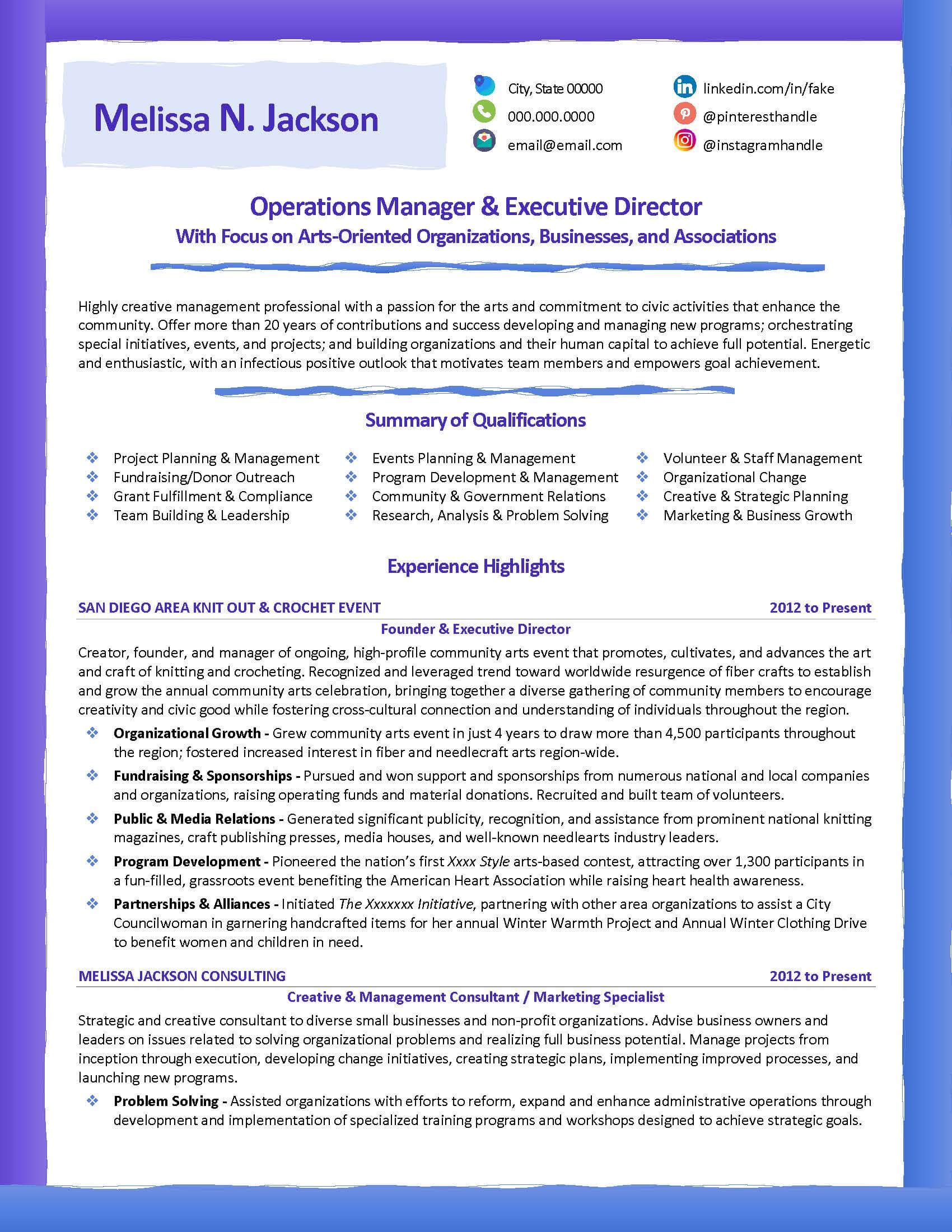
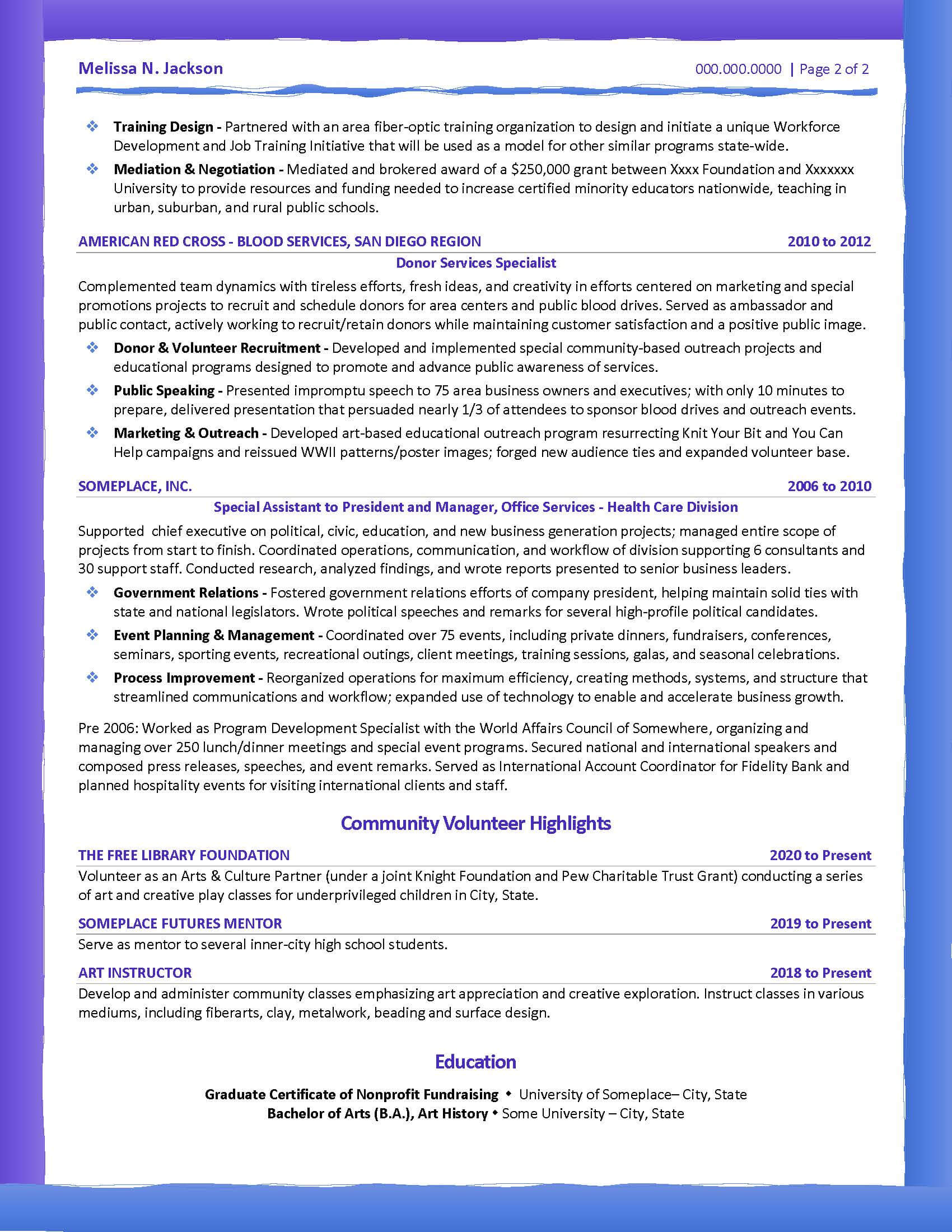
Resume for Returning to Paid Employment After Raising Children
The Situation
Nancy Dunsmore worked in paid positions for a few years after graduating from college but left the workforce well over a decade ago to raise her children.
Although it was unpaid work, for much of the time she was out of the paid workforce, Nancy stayed busy doing church volunteer work, managing successful fundraising events for her children’s schools, and doing other volunteer work in her community.
Now, Nancy was ready to return to the workforce and was interested in restarting her career in sales and marketing.
The Problem
Nancy’s resume would have had a significant employment gap had we led with her older employment experience. Also, while she had a great deal of volunteer experience directly related to her job target, listing it at the end of the resume in a volunteering section would mean that many hiring managers would overlook it.
The Solution
The professional summary section of Nancy’s resume showcases her professional skills and qualifications developed through both paid experience and volunteer experience. Immediately following this, we developed a special separate volunteer experience section titled “Recent Fundraising, Marketing, and Leadership Experience.” This helped us emphasize that Nancy’s extensive history of volunteer work was relevant to the job she hoped to land.
On the second page, Nancy’s early work history is included in a separate work experience section titled “Marketing and Sales Background.” If you review the example resume, you’ll notice that we’ve used an unusual strategy in this section. Instead of listing actual years of employment, we noted the number of years in each position.
We chose to use this strategy because there was a sizeable recent gap in Nancy’s work history and other gaps between her few employment experiences. However, this is a radical strategy that we would not recommend if you are writing your own resume, as the pros and cons need to be carefully assessed. Instead, we highly recommend consulting a certified professional resume writer, such as the resume writers on the Distinctive Career Services Team.
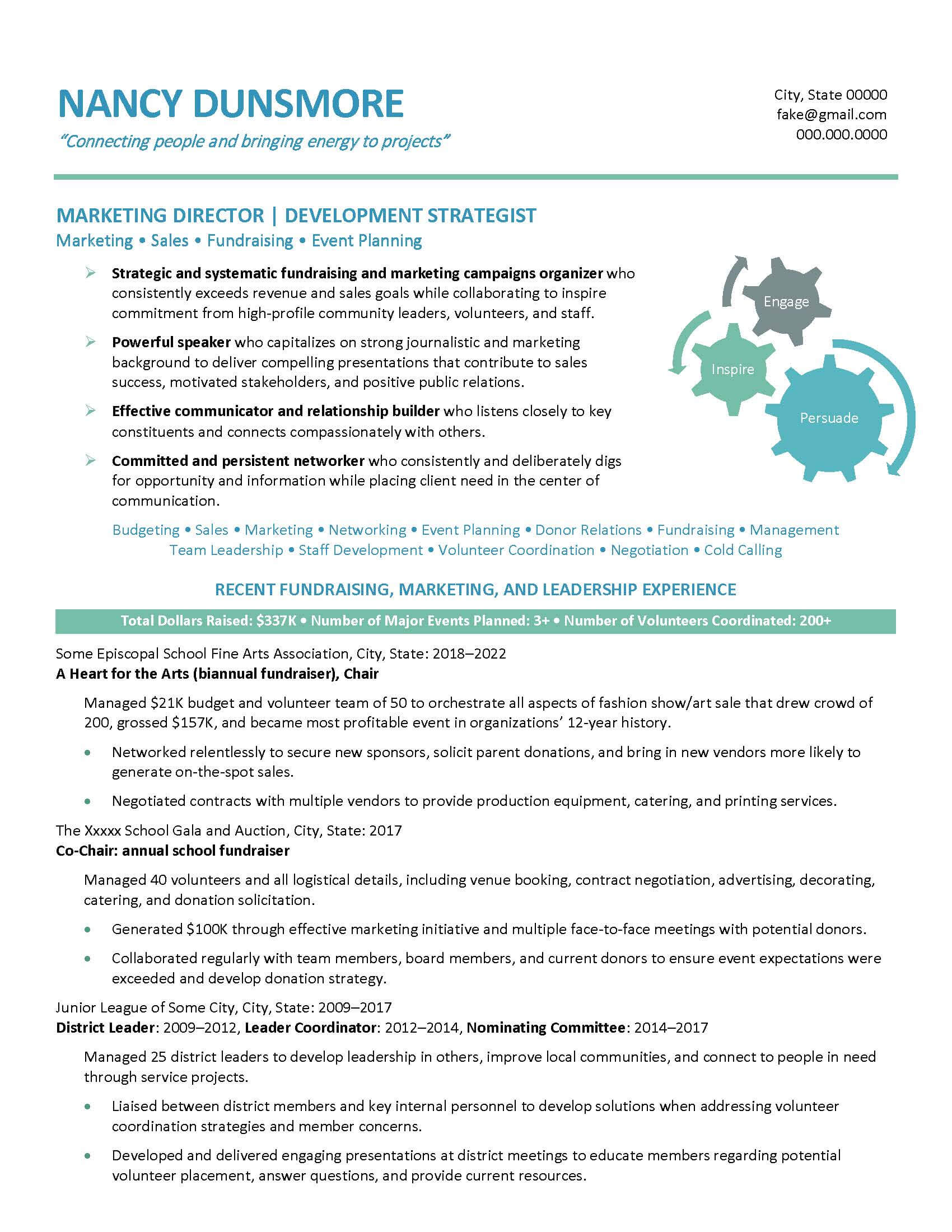
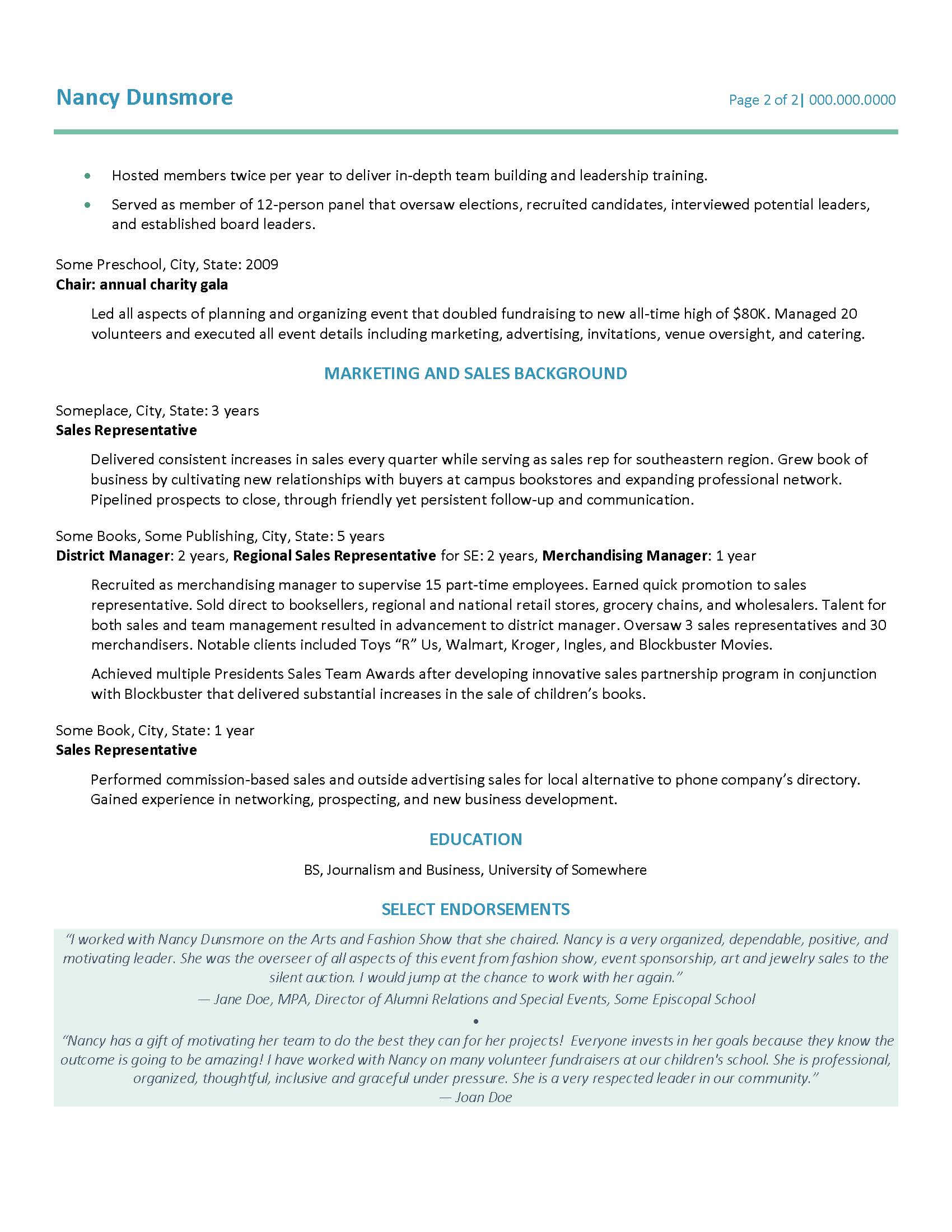
Volunteer Work Rounds Out the Resume of a Young Professional
The Situation
Charlie Buchanan was a young professional seeking a job as a project engineer. His experience included two internships, one of which became a full-time job.
The Problem
There were no real problems to overcome in this engineering resume. Charlie had gained strong experience in his internships, and one of those internships had turned into paid experience, indicating that the hiring manager believed he was adding value to the company.
The Solution
For Charlie’s resume, we decided to use a resume format and structure that is common for new graduates with little work experience. Charlie’s recent degree was still one of his strongest qualifications, so we led with that and followed that with a “Work Experience” section in which we included his internships and his employment history.
The “Volunteer Experience” section at the end of the resume provides a place to list Charlie’s volunteer work. One of the volunteer jobs was directly related to Charlie’s job as a project engineer with a building company. For now, this experience helps to round out Charlie’s qualifications and creates the impression of a community-minded professional, which will help him to stand out to hiring managers.
Of course, resume real estate is valuable. As Charlie gains more paid experience in his field, we will drop the volunteer section to make room for the newer and more relevant work experience.
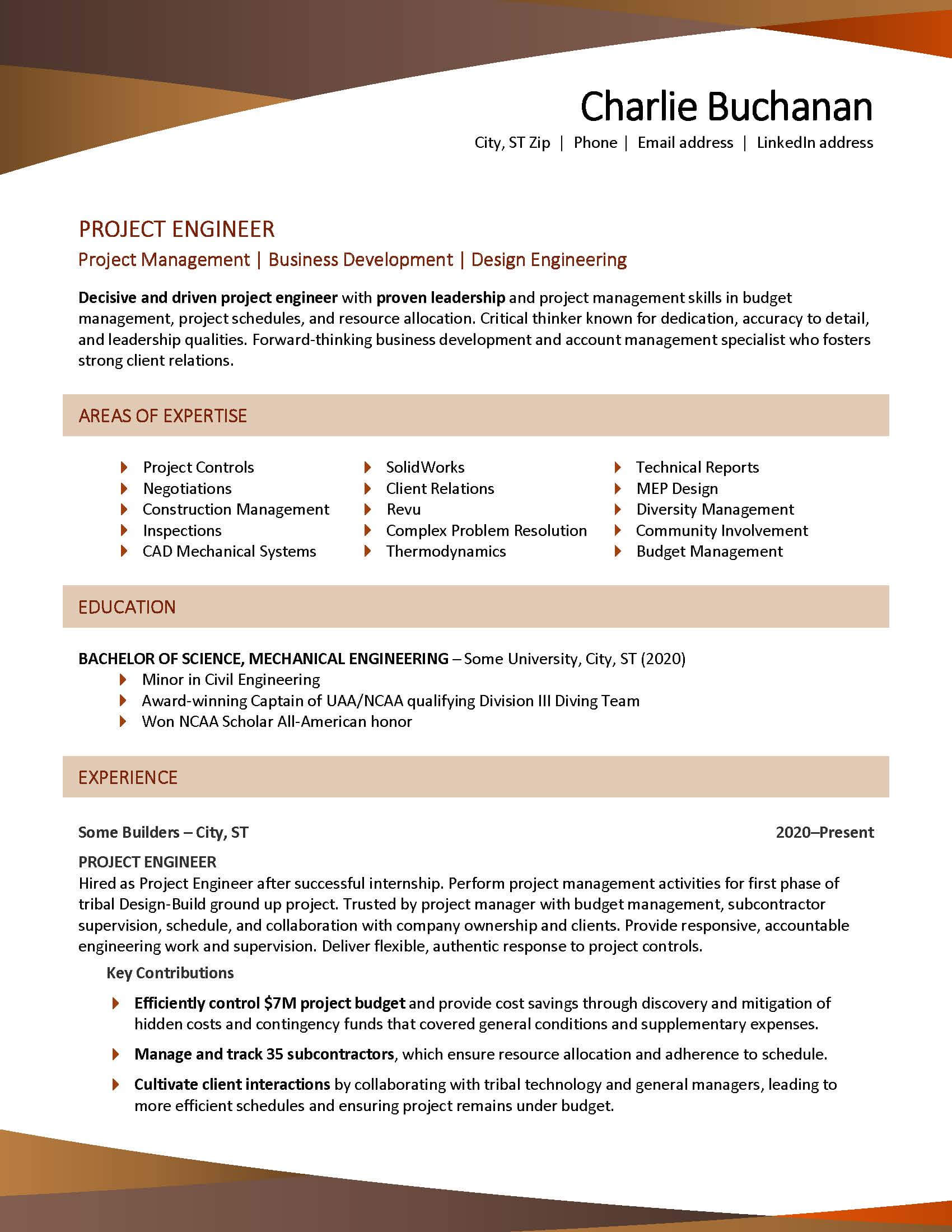

More Pro Tips on How to List Volunteer Experience on Your Resume
In general, when listing volunteer experience on your resume, start with the name of the organization followed by its location and the dates that you volunteered. Sometimes, you may be given a formal “job title” as a volunteer. If so, you may include this too.
Then include a brief job description of your volunteer work, followed by specific accomplishments or contributions achieved during those experiences. Be sure to use action verbs such as “mentored” or “coordinated” when writing about these experiences so that employers can visualize what type of work you did in those roles. If you have more than a few lines of description, it can be helpful to use bullet points. These make your resume easier to read.
Regardless of how and where you have listed your volunteer work on your resume, you may also list skills you gained from volunteering in your resume summary or a skills summary if you have included one. To see how we have done this, take another look at the resume examples in this post.
Of course, you only want to list relevant skills. To decide what is relevant, read the job listing you are applying for and look for the required and desired qualifications. It doesn’t matter how you gained these qualifications. It only matters that you have them. So, even if the skills came from your volunteering, make sure to highlight them prominently.

Final Thoughts About Volunteer Work on Your Resume
As you’ve seen in this post, adding volunteer work to your resume can offer many benefits when applying for jobs.
Not only does it show the potential employer that you are dedicated and have a strong sense of social responsibility, but it can also provide additional relevant experience related to the job or industry you wish to pursue.
If you are struggling to write your own resume and incorporate your volunteer experience, stop. There is no need to struggle! The Distinctive Career Services’ professional resume writing team can help! Schedule a call today to learn more and get a quote for your resume writing project. We are here for you!
Frequently Asked Questions
Can adding volunteer work to my resume help me get a job?
Yes, adding volunteer work to your resume can make you more competitive in a job search. Volunteer experiences can provide you with new skills, help you explore career paths, and demonstrate your character and values to potential employers.
What skills can I gain from volunteering?
Volunteering can help you develop a wide range of skills, such as customer service, communication, teamwork, and event planning. You could also learn to apply your existing skills in new and innovative ways.
How can volunteering give me a competitive edge when applying for jobs?
Volunteer work can make you stand out in the job market by demonstrating your leadership skills, sense of social responsibility, and commitment to giving back to your community. It can also help you bridge the gap between education and experience, making you a more attractive candidate to potential employers.
Where can I find volunteer opportunities?
There are many resources for finding volunteer opportunities, such as VolunteerMatch and AmeriCorps. These organizations can match you with service opportunities that align with your skills and interests.
How should I list volunteer experience on my resume?
When listing volunteer experience on your resume, start with the name of the organization, its location, and the dates you volunteered. Include any formal job titles you held as a volunteer, a brief description of your duties, and any significant accomplishments or contributions you made during your volunteer experience.
Can volunteer work help me overcome employment gaps in my resume?
Yes, volunteer work can help fill employment gaps on your resume. It shows potential employers that you remained active and committed to developing your skills and experience, even while not in a paid role.
Can volunteering lead to job offers in my desired field?
Yes, volunteering can often lead to networking opportunities with people in your field or industry. These connections may eventually lead to job offers down the line.
How can volunteer work enhance my college application?
Many universities prefer applicants with volunteer experience as it demonstrates leadership skills and a strong sense of social responsibility. Therefore, volunteering can greatly enhance your college application.
How can I use my skills in new ways through volunteering?
Volunteering allows you to apply your skills in a different environment, helping you explore new interests and ideas. It’s a unique opportunity to make a positive impact on your community while learning and developing your abilities further.
Can volunteer work improve my mental outlook?
Yes, volunteering can improve your mental outlook by giving you a sense of purpose and fulfillment. This positive attitude can make you a more attractive candidate to hiring managers.









